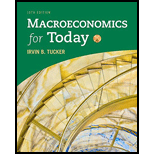
The three motives of demand for money.
Explanation of Solution
People hold money mainly for transaction purpose, precautionary purpose, and speculative purpose. The amount of holding money depends not only on the rate of interest but also on the price. Demand for money and interest rate are inversely related because when the rate of interest increases, the
Option (a):
The demand for money for the purpose of three motives (transaction motive, precautionary motive, and speculative motive) is positively related with the income. When the income level increases, the transaction demand for money, precautionary demand for money, and speculative demand for money also increase and vice versa.
Option (b):
The demand for money for transaction motive and precautionary motive is positively related with the interest rate. Speculative motive is negatively related with the interest rate. The purchase of bonds and other assets are related with the transaction motive. Thus, decreasing the interest rate on bonds and other assets leads to reduce the demand for money to spend on (purchase) bonds and other assets.
Option (c):
When an automated teller machine is installed near a person, the demand for holding money for transaction and precautionary motive decreases because money is available at any time and hence, there is no necessity to keep money and also, the person gets an amount of interest.
Option (d):
Demand for money and
Option (e):
People always hold money mainly for transaction motive, precautionary motive, and speculative motive. When a person gets income on weekly basis instead of monthly basis, then it is not necessary to keep more money. Thus, the transaction demand for money and precautionary demand for money decrease.
Demand for money: Demand for money refers to the amount of money that households and firms desire to hold at different nominal interest rates.
Opportunity cost: Opportunity cost refers to the benefits given up in the process of obtaining some other benefits.
Transaction demand for money: Transaction demand for money is the holding of money to meet the everyday expenses of a person.
Precautionary demand for money: Precautionary demand for money is the amount of money held by a person for contingency purpose.
Speculative demand for money: Speculative demand for money is the money held by people to take advantage from change in the price of bonds and other assets.
Want to see more full solutions like this?
Chapter 16 Solutions
MACROECONOMICS FOR TODAY



 Principles of Economics (MindTap Course List)EconomicsISBN:9781305585126Author:N. Gregory MankiwPublisher:Cengage Learning
Principles of Economics (MindTap Course List)EconomicsISBN:9781305585126Author:N. Gregory MankiwPublisher:Cengage Learning Brief Principles of Macroeconomics (MindTap Cours...EconomicsISBN:9781337091985Author:N. Gregory MankiwPublisher:Cengage Learning
Brief Principles of Macroeconomics (MindTap Cours...EconomicsISBN:9781337091985Author:N. Gregory MankiwPublisher:Cengage Learning Principles of Macroeconomics (MindTap Course List)EconomicsISBN:9781285165912Author:N. Gregory MankiwPublisher:Cengage Learning
Principles of Macroeconomics (MindTap Course List)EconomicsISBN:9781285165912Author:N. Gregory MankiwPublisher:Cengage Learning





